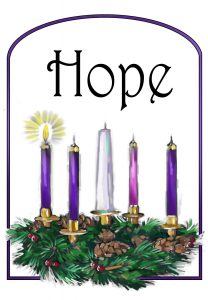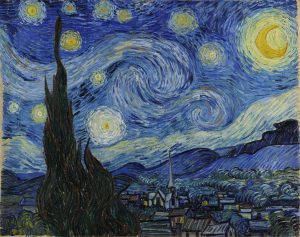Nerys writes: Whether you have an Advent candle set or just one candle, I would invite you to join in with the following prayer as you light it today:
God of our deepest longing,
all our hopes are met in you.
You hear our heart’s cry,
You know our deepest need.
Meet us in this place,
speak to us through the silence,
Touch us with your healing love,
that we may share your hopes
for the whole creation,
in and through Jesus,
the child who is to come.
Amen.

For anyone who thinks of Advent as a straight-forward Countdown to Christmas, today’s readings will come as a bit of a shock. There is nothing straight-forward about Advent, the most puzzling and unpredictable of all the seasons of the church year. A time when we’re called to bend our minds around the idea of the Kingdom of God which is already here and yet to come. This is not a time for head-knowledge but for an understanding that comes from the heart, a time to draw on our past experiences of God as we face the reality of our present struggles, trusting in God’s promises for our future. It is this process that we see at work in all three of our readings today, Jeremiah 33.14-16, 1 Thessalonians 3.9-13 and Luke 21.25-36, a process which encourages us to see signs of hope in the midst of disaster and, by proclaiming and living that hope, to become a light in the darkness for others.
The prophet Jeremiah speaks at a time of terror and great suffering for the people of Judah. The enemies of Jerusalem were besieging the city as Jeremiah had said they would. Imprisoned by his own king for being right, the prophet speaks to the people who are at the edge of despair. But instead of the usual dark prophecies of doom which would be expected from him, Jeremiah utters words of hope and light. He offers a vision of a time when God would fulfil his promise to his people, a time when Judah would be saved and Jerusalem would live in safety, led by a king who would promote justice and mercy in the land. He encourages his listeners to imagine this alternative future which is far removed from their current circumstances, so that, instead of seeking to make the best of a bad situation, they would hold on to their faith, longing for the day when God’s promise of a just and peaceful world would become a reality.
St Paul and his companions were also living in a time of distress and persecution when he wrote his letter to the fledgling Christian community at Thessalonica. Having been forced to leave them earlier than he would have wished, Paul would naturally have been terribly worried about them especially when he heard that there had been unexpected deaths among their number. Did they in their grief still remember what he had taught them? Were they still constant in their faith? He could have easily despaired of them, but instead his letter contains expressions of joy and gratitude based on faith-filled hope. The understanding of these new Christians may not have been complete, but Paul gives thanks in advance for the mature faith that is yet to come. Like Jeremiah, he encourages the readers of his letter then and now to imagine an alternative future where they would grow in holiness and in love for one another.
In today’s Gospel, we see a side to Luke that we might prefer to overlook. He is a writer we associate with heart-warming stories and picturesque details, not with apocalyptic images warning of global disaster. But Luke, like Paul and Jeremiah, was writing at a time of great distress. Jerusalem had again been under siege, its people had endured starvation, civil strife and military defeat, and many Christians had been caught in the middle. Twenty years later, with the temple in ruins, Luke’s first audience were still trying to make sense of what had happened whilst living amidst great uncertainty. Luke draws on the prophetic language of earlier writers to express the convulsions that the world was experiencing in his day as the Roman peace was shattering from the inside. But he turns traditional imagery on its head so that, instead of announcing the end, the sun, moon and stars and roaring seas proclaim a new beginning, the coming of God’s promised kingdom. Luke’s Jesus, talking to his disciples just a short time before his arrest and death, encourages them not to be overwhelmed when disaster threatens but to stand head up, like a dog sniffing the air for the familiar scent of his master who is coming to save him. He calls them not to give in to fear but to look out for signs of the kingdom which are like the buds on the tree heralding summer.
Like Luke’s first readers, as we struggle to stay positive in these tough, turbulent times, we are called to always be on the lookout for signs of God’s presence among us now, and of the coming of God’s kingdom of justice and mercy.
Like the Thessalonians, we are called this Advent to encourage one another to grow in holiness and to live lovingly, following the examples of Christ.
Like the people of Judah, we are called to trust in God’s promised alternative future for our world today as we pray and work together for a society free from inequality, division and violence.

You may wish to reflect on Van Gogh, ‘The Starry Night’ which depicts an apocalyptic sky like that described by Luke’s Jesus and captures the mood of Advent and/or on the words of Ally Barrett’s new Advent hymn as an introduction to your time of prayer today.
Longing for a hope-filled morning,
kingdom of the Son, draw near!
Waiting for the day soon dawning,
light of love that casts out fear.
Dayspring, come from heav’n, in lowly birth,
come to warm this cold, dark earth.
Sorrow through the world is sweeping,
bitter conflict rages still,
heaven hears its children weeping:
price of humankind’s freewill.
Come, O Prince of Peace, in lowly birth,
come to mend this broken earth.
Reaching out through human history,
bring your scattered children home,
such an act of love! What mystery:
God appears in flesh and bone.
Come, Emmanuel, in lowly birth,
show how heaven embraces earth.
(to be sung on the tune Picardy used also for ‘Let all mortal flesh keep silence’)






